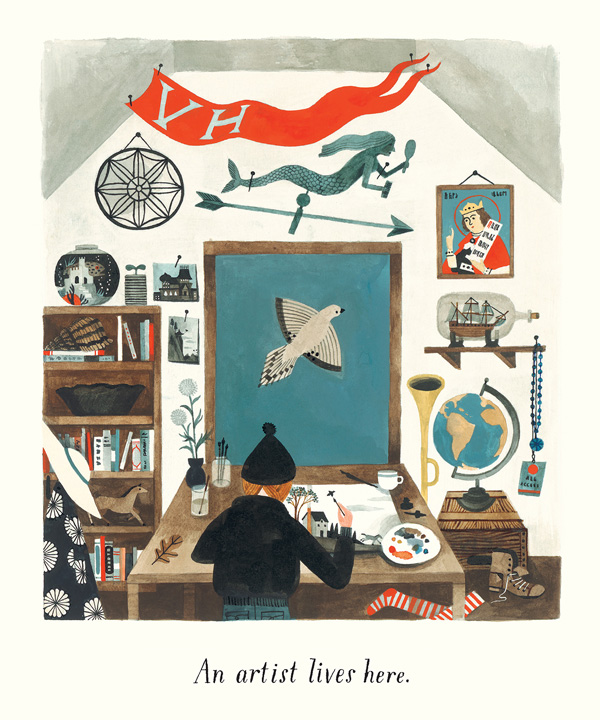Young Delacroix on the Importance of Solitude in Creative Work and How to Resist Social Distractions
“Nourish yourself with grand and austere ideas of beauty that feed the soul… Seek solitude.”
“One can never be alone enough to write,” Susan Sontag lamented in her journal. “People who grow bored in their own company seem to me in danger,” the great Russian filmmaker Andrei Tarkovsky admonished the young. And yet despite the vast creative and psychological benefits of boredom, we have grown so afraid of it that we have unlearned — or refused to learn altogether — the essential art of being alone, so very necessary for contemplation and creative work.
The great French artist and dedicated diarist Eugène Delacroix (April 26, 1798–August 13, 1863) examined this paradox with enormous elegance and prescience two centuries before our present epidemic of compulsive sociality and allergy to solitude.
As he approached his twenty-sixth birthday, Delacroix began to formulate what would become a defining concern of his youth and one of increasing urgency for us today, amid our age of exponentially swelling social demands and distractions — the challenge of mediating between the allure of social life and the “fertile solitude” necessary for creative work, which Hemingway grimly extolled in his Nobel Prize acceptance speech.
Eugène Delacroix, self-portrait, 1837
Writing in The Journal of Eugène Delacroix (public library) in early January of 1824, the young artist addresses himself directly, as he often does in the diary:
Poor fellow! How can you do great work when you’re always having to rub shoulders with everything that is vulgar. Think of the great Michelangelo. Nourish yourself with grand and austere ideas of beauty that feed the soul. You are always being lured away by foolish distractions. Seek solitude. If your life is well ordered your health will not suffer.
By the end of March, he is fully consumed by the polarizing pull of these conflicting needs for sociality and solitude. (A century and a half later, the great Wendell Berry captured their yin-yang beautifully when he wrote that in solitude “one’s inner voices become audible [and] one responds more clearly to other lives.”) In his growing contempt for the vulgarity of the art world’s posturing and the charade of networking, Delacroix finds himself doubly tormented by this polarity:
I must work alone. I think that going into society from time to time, or just going out and seeing people, does not do much harm to one’s work and spiritual progress, in spite of what many so-called artists say to the contrary. Associating with people of that kind is far more dangerous; their conversation is always commonplace. I must go back to being alone. Moreover, I must try to live austerely, as Plato did. How can one keep one’s enthusiasm concentrated on a subject when one is always at the mercy of other people and in constant need of their society? … The things we experience for ourselves when we are alone are much stronger and much fresher. However pleasant it may be to communicate one’s emotions to a friend there are too many fine shades of feeling to be explained, and although each probably perceives them, he does so in his own way an d thus the impression is weakened for both.
The first Sunday of April, shortly before his twenty-sixth birthday, he revisits the subject with greater resolve:
Everything tells me that I need to live a more solitary life. The loveliest and most precious moments of my life are slipping away in amusements which, in truth, bring me nothing but boredom. The possibility, or the constant expectation, of being interrupted is already beginning to weaken what little strength I have left after wasting my time for hours the night before. When my memory has nothing important to feed on, it pines and dies. My mind is continually occupied in useless scheming. Countless valuable ideas miscarry because there is no continuity in my thoughts. They burn me up and lay my mind to waste. The enemy is within my gates, in my very heart; I feel his hand everywhere.
Two decades before Kierkegaard’s memorable case for the value of being “idle” in one’s own company and a century before Bertrand Russell’s incisive insistence on the rewards of “fruitful monotony,” young Delacroix exhorts himself:
Think of the blessings that await you, not of the emptiness that drives you to seek constant distraction. Think of having peace of mind and a reliable memory, of the self-control that a well-ordained life will bring, of health not undermined by endless concessions to the passing excesses which other people’s society entails, of uninterrupted work, and plenty of it.
Illustration by Carson Ellis from her book 'Home.'
The Journal of Eugène Delacroix is a magnificent read in its entirety — a treasure trove of insight on art and life from one of the most luminous and creatively restless minds in history. (A word of caution here: The 1995 Phaidon edition by Hubert Wellington, while affordable and more readily available, is printed on paper so woefully thin it is nearly translucent, making reading difficult and unpleasant — to say nothing of underlining, even the gentlest form of which practically tears the page. The 1995 Princeton University Press edition by Michele Hannosh, while out of print and prohibitively expensive, is far superior — pleasurably printed, intelligently edited, and a true masterwork of scholarship reconstructing missing documents. Perhaps a smart publisher invested in cultural preservation will consider bringing it back into print.)
For a complementary perspective, see Wendell Berry on despair and solitude, psychoanalyst Adam Phillips on why “productive solitude” is essential for the healthy psyche, and Sara Maitland on how to be alone in our age of inescapable togetherness, then revisit famous writers and artists — including Delacroix himself — on the creative benefits of keeping a diary.
This article originally appeared in Brain Pickings and is republished with permission. The author, Maria Popova, is a cultural curator and curious mind at large, who also writes for Wired UK, The Atlantic and Design Observer, and is the founder and editor in chief of Brain Pickings.





On Jun 24, 2015 Kristin Pedemonti wrote:
wow, needed this today. Ironically, I had just posted on facebook about taking time for introspection, thank you Daily Good for the timely post. :)
Post Your Reply